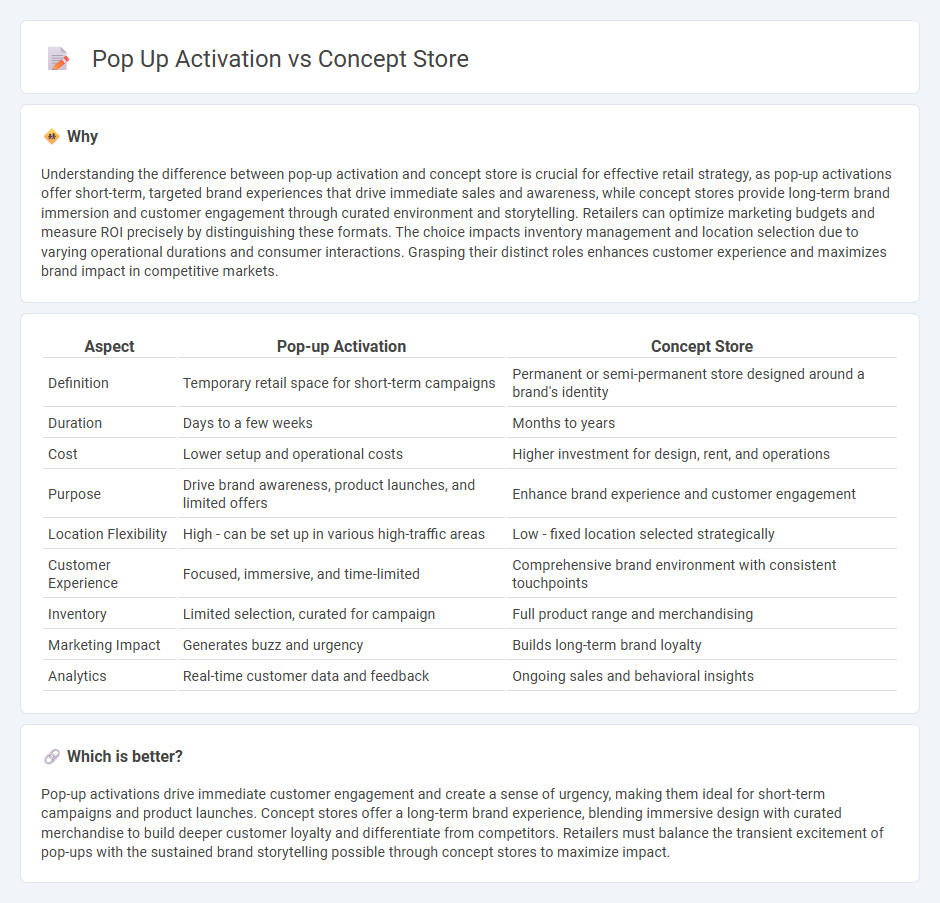
Pop-up activations offer retailers a flexible, short-term strategy to generate buzz and test new markets with minimal investment, while concept stores provide a permanent space to showcase brand identity and create immersive customer experiences. Pop-up events typically last from a few days to a few weeks, driving urgency and exclusivity, whereas concept stores focus on long-term engagement and brand loyalty through curated product selections and innovative store designs. Explore the unique advantages of each approach to enhance your retail strategy effectively.
Why it is important
Understanding the difference between pop-up activation and concept store is crucial for effective retail strategy, as pop-up activations offer short-term, targeted brand experiences that drive immediate sales and awareness, while concept stores provide long-term brand immersion and customer engagement through curated environment and storytelling. Retailers can optimize marketing budgets and measure ROI precisely by distinguishing these formats. The choice impacts inventory management and location selection due to varying operational durations and consumer interactions. Grasping their distinct roles enhances customer experience and maximizes brand impact in competitive markets.
Comparison Table
| Aspect | Pop-up Activation | Concept Store |
|---|---|---|
| Definition | Temporary retail space for short-term campaigns | Permanent or semi-permanent store designed around a brand's identity |
| Duration | Days to a few weeks | Months to years |
| Cost | Lower setup and operational costs | Higher investment for design, rent, and operations |
| Purpose | Drive brand awareness, product launches, and limited offers | Enhance brand experience and customer engagement |
| Location Flexibility | High - can be set up in various high-traffic areas | Low - fixed location selected strategically |
| Customer Experience | Focused, immersive, and time-limited | Comprehensive brand environment with consistent touchpoints |
| Inventory | Limited selection, curated for campaign | Full product range and merchandising |
| Marketing Impact | Generates buzz and urgency | Builds long-term brand loyalty |
| Analytics | Real-time customer data and feedback | Ongoing sales and behavioral insights |
Which is better?
Pop-up activations drive immediate customer engagement and create a sense of urgency, making them ideal for short-term campaigns and product launches. Concept stores offer a long-term brand experience, blending immersive design with curated merchandise to build deeper customer loyalty and differentiate from competitors. Retailers must balance the transient excitement of pop-ups with the sustained brand storytelling possible through concept stores to maximize impact.
Connection
Pop-up activations and concept stores both serve as dynamic retail strategies designed to create immersive shopping experiences and boost brand engagement. Pop-up activations provide temporary, eye-catching environments that generate buzz and test market responses, while concept stores offer curated, long-term spaces that embody a brand's identity and innovation. Together, they enhance customer interaction by combining immediacy and exclusivity with deeper brand storytelling.
Key Terms
Experiential retail
Concept stores provide a permanent retail space designed to immerse customers in a curated brand experience through innovative product displays and interactive elements. Pop-up activations offer temporal, high-impact encounters that create urgency and exclusivity, driving immediate engagement and brand buzz. Explore how leveraging these experiential retail strategies can elevate consumer connection and brand loyalty.
Temporary setup
Temporary setups in retail differentiate concept stores and pop-up activations through duration and purpose, with concept stores offering a semi-permanent space to showcase a curated brand experience, while pop-ups serve as short-term, high-impact marketing events designed to generate immediate interest. Concept stores integrate multiple brand touchpoints under one roof, enabling sustained customer engagement, whereas pop-ups prioritize urgency and exclusivity to drive quick sales and brand awareness. Explore further to understand which temporary retail model best fits your strategic goals.
Brand engagement
Concept stores create immersive brand environments, offering consistent, long-term customer engagement through curated product displays and exclusive experiences. Pop-up activations provide short-term, high-impact interactions designed to generate immediate buzz and trial opportunities, often leveraging limited-time offers or events. Explore how each strategy can elevate your brand engagement and drive customer loyalty.
Source and External Links
Concept Store: Definition, Tips, & Ideas - Wonnda - A concept store is a retail space offering a curated, immersive shopping experience centered around a specific lifestyle or aesthetic, distinguishing itself from traditional stores by its cohesive, thematic product selection and ambiance.
What is a Concept Store? - Hopono - Concept stores are designed to deliver a complete, immersive experience, often combining varied collections, art, design, gastronomy, technology, and even cultural events, all unified by a strong, unique concept.
What is a concept store? - Insider Trends - A concept store sells a carefully curated selection of products tied to an overarching theme, often mixing different product lines and offering experiential elements like cafes or event spaces to foster a sense of community and discovery.
 dowidth.com
dowidth.com